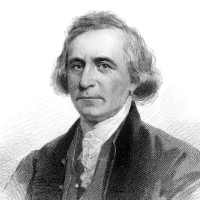Philip Morin Freneau - Biography and Works
Philip Morin Freneau is one of the earliest American poets; he was also a journalist, known as the poet of the American Revolution. Born in New York City and educated at the College of New Jersey (now Princeton, University), Freneau is also remembered as the earliest American lyric poet. His work marks the first use of particular, concrete images in American verse. Before Freneau, generality and abstraction reigned; versified didacticism was the all-pervading form of literature. Freneau was a new poet of America in that he began the satiric mode of writing.

Philip Morin Freneau (1752-1832)
His reputation as a satirist was first achieved with a series of vitriolic poems attacking the British, written shortly after the outbreak of the Revolution. Early in 1780, Freneau took part in a private expedition to the West Indies. He was captured by the British and imprisoned aboard a ship in New York Harbor. The harsh treatment he received during his confinement provided him with material for The British Prison-Ship, a Poem in Four Cantos (1781). While working in the post office in Philadelphia (1781-84), he continued to produce brilliant, satiric verse in the same patriotic vein.
Freneau spent the next six years at sea, and in 1791 Secretary of State Thomas Jefferson appointed him a translator. While serving in that capacity, Freneau founded and was editor of the National Gazette, a newspaper that gave forceful expression to the libertarian ideals of Jeffersonian democracy and that attacked the American statesman Alexander Hamilton and the Federalist Party. Among his most famous individual poems are "The Wild Honeysuckle", The House e of Night", and "The Indian Burring Ground".
Freneau belongs to the revolutionary era in which the poets produced patriotic as well as satiric poetry. Revolutionary-era poets composed more than satire, however. They felt an urgency to produce a serious-even monumental- national poetry that would celebrate the country’s new democratic ideals. Epic poems, they believed, would confer importance and significance of the new nation's culture. American epics by necessity celebrated the future. Examples of such epics include Barlow’s The Vision of Columbus (1787), later revised as The Columbiad (1807), and The Rising Glory of America (1772) by Philip Freneau. All offered the prospect of America as the future culmination of civilization. Freneau's range of experience and clarity of expression made him a very popular poet, widely regarded as the first poet who spoke for the entire country. Much of his poetry focused on America’s future greatness, but he also wrote on other subjects, including the beauties of the natural world. Such lyric poems as “The Wild Honey Suckle” and “Indian Burying Ground” can be seen as the first expressions in American poetry of a deep spiritual engagement with nature, and even the natives.
Cite this Page!
Sharma, K.N. "Philip Morin Freneau - Biography and Works." BachelorandMaster, 16 Nov. 2013, bachelorandmaster.com/biography/philip-morin-freneau.html.
